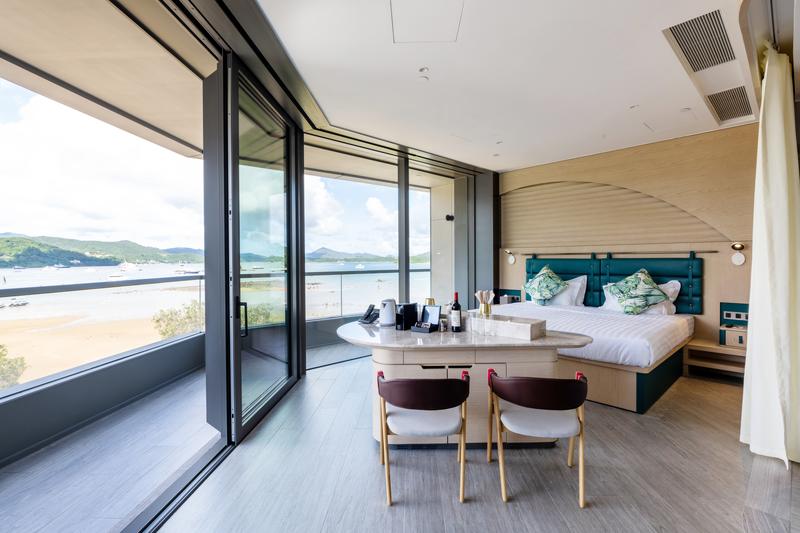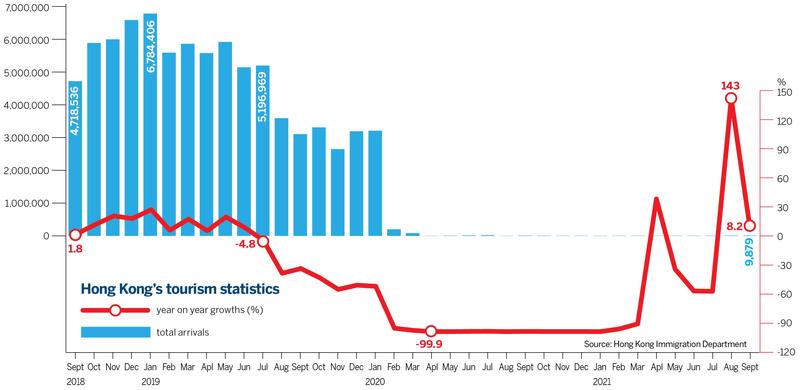After nearly two years in the doldrums, providing a better local traveling experience has become the goal of Hong Kong’s tourism industry moving forward. Su Zihan reports from Hong Kong.

Put on a mermaid-tail-shaped flipper and a diving goggle, hold your breath for 30 seconds, follow your instructor, and jump into the pool. You will be able to experience swimming leisurely like a real mermaid, while photographers capture the moment you are longing for.
Some may have even dreamed of being a “mermaid princess” in their childhood, waving her shiny tail through the waves and dancing with the fish among the coral and water plants.
(Hong Kong) People tend to be booking something more high-end. They are looking for something that’s worth more and don’t mind paying more for it. They are getting accustomed to experiencing the quality of staycation as traveling abroad is less free than before
Hillman Lam, general manager of Trip.com Hong Kong
The tourism industry has gone through an unprecedented crisis from the global impact of the COVID-19 pandemic, causing the number of visitors to Hong Kong to plummet in the past two years. But amid the industry’s woes, some previously unknown experiences have become popular.
Founded in 2015, Mermaid Federation International — a global organization catering to aquatic sports lovers — had recorded twice as many students this summer as it did before the pandemic. The mermaid underwater swimming training facility is dedicated to teaching and offering experiences in underwater performances in a mermaid costume, as well as enabling participants to have a taste of activities like underwater makeup and fish-tail-making.
“Before the pandemic, usually about 50 students would join our mermaid courses each summer. But this year, before September, I had taught up to almost 100 students,” said Yukki Wong, MFI’s chief operating officer and mermaid instructor.
Staycations are the order of the day as the pandemic confines Hong Kong people to their homes, making them unable to venture overseas and prompting them to explore new experiences in the city. As a result, many niche places and activities have emerged, Wong said.
The demand for travel and spending sentiment among consumers continue to grow, with increased social activities as the Hong Kong Special Administrative Region government and local businesses take proactive measures to address COVID-19.
As the Chinese mainland maintains its strict approach to combating COVID-19, including a mandatory 21-day quarantine for visitors, it’s difficult for tourist dollars to continue flowing into Hong Kong. This has led to a shift in tourism to cater to the city’s 7.4 million residents. Yet not every company’s business has managed to stay attractive amid the financial crunch.
In September, Hong Kong travel agency Ulu Travel launched bus tours dedicated to allowing customers just to sleep, claiming to have designed the “longest bus route in Hong Kong’s history”. The tour started from Tsuen Wan West, taking customers along the Tuen Mun Highway to north Lantau Island, covering a distance of 76 kilometers at a cost of between HK$99 ($12.70) and HK$399. Three types of seats were available — a “zero-decibel sleeping cabin” on the upper deck; a “VIP panorama cabin” at the front of the upper deck, where talking is strictly prohibited; and a “photo-taking cabin” on the lower deck, where chatting was allowed.
The service targeted customers who loved to sleep on buses but were unable to get enough sleep on short bus trips, offering them “quality” sleeping.
 A staycation room picture posted by a hotel on the online travel company Trip.com. (PHOTO PROVIDED TO CHINA DAILY)
A staycation room picture posted by a hotel on the online travel company Trip.com. (PHOTO PROVIDED TO CHINA DAILY)
Tickets for the first “bus sleeping tour” were snapped up within hours. However, the pandemic has placed greater demands on the industry to innovate. The “bus sleeping tour” lasted less than two months before being called off.
According to comments on the internet, some people thought it would be more cost-effective to take staycations than having a “bus sleeping tour”.
For the tourism sector to better evolve in the post-pandemic economic recovery, the changes in travelers’ needs and attitudes must be better understood, said Jane Sun, CEO of Trip.com Group. She urged the industry to adapt to emerging consumer trends in travel and tourism.
But although the HKSAR government is actively seeking to ease border restrictions with the mainland, there seems to be a long way to go before the travel restrictions are fully lifted.
Normalizing cross-border travel is still an expectation at the moment. Rather, there could be more restrictions on cross-border movements because uncertainties still exist under current circumstances, warned Edward Yau Tang-wah, secretary for commerce and economic development. But he believes the process will be gradual, with business travel likely to be restored initially.
In his view, any resumption of normal cross-border travel will involve people engaged in high-end business activities.
While there are hardly any inbound customers yet, some companies eyeing the local tourism market have jumped on the bandwagon, targeting those seeking high-end services and experiences.
According to a Trending in Travel global report jointly released by Trip.com Group and the World Travel and Tourism Council on Nov 25, Hong Kong’s staycation boom is set to stay for now as local residents have been subject to travel curbs for the past two years. The pent-up demand for travel has continued to surge during the pandemic, with luxury hotels among the most popular staycation choices.
 Hillman Lam, general manager of Trip.com Hong Kong. (PHOTO PROVIDED TO CHINA DAILY)
Hillman Lam, general manager of Trip.com Hong Kong. (PHOTO PROVIDED TO CHINA DAILY)
Opportunities amid crisis
Trip.com Hong Kong — one of the sub-brands of Trip.com Group — said its bookings for luxury hotels have increased during the pandemic, with a 213 percent rise in the third quarter of this year compared to the same period in 2019, and a 10 percent surge in overall bookings from two years ago.
The latest data shows that staycations have continued to lead the industry trend this year. The first two quarters of 2021 saw year-on-year growth of more than 200 percent in Hong Kong’s domestic hotel bookings compared with 2019. Local hotel bookings in the third quarter were up 187 percent from the third quarter of 2019 — up 108 percent year-on-year.
Hong Kong people have been shifting their interest from traveling overseas to staying in the city. There has been a growing demand for local trips, said Hillman Lam, general manager of Trip.com Hong Kong.
“People tend to be booking something more high-end. They are looking for something that’s worth more and don’t mind paying more for it,” he said. They are getting accustomed to experiencing the quality of staycation as traveling abroad is less free than before, and a family flying to a neighboring city or country costs more, he added.
The multinational online travel company has launched various types of staycations according to customers’ needs as the pandemic eases in Hong Kong. They include luxury, midrange, and some affordable ones, ranging from around HK$500 to HK$3,000 per night for each person. These staycation hotels do not simply offer accommodation, but also dining credits, children and family activities, and even input theaters, depending on the price of the room.
To arouse people’s interest in staycation in the initial stages, Trip.com rolled out a livestreaming campaign to allow customers to visualize the hotel experience, such as cozy restaurants with breathtaking views, as well as a sound hygienic environment.
Consumers are also allowed flexible cancellation of bookings, rebooking or refunds to avoid penalties and losses, according to Trip.com’s report.
The uncertainties arising from the pandemic have seen an increase in shorter booking windows for travelers, with most of them booking one to three days in advance of travel. According to the company’s global data, the length of hotel booking windows had dropped from 32 days in the first half of 2019 to 10 days in the first half of this year.

To allay concerns and uncertainties about traveling during the pandemic, customers are advised to think carefully before they book rooms from the livestreaming campaign and schedule their check-in date later, Lam said. This would make travel more flexible and, to some extent, encourage more reservations.
As for the future prospects of the tourism business after normal cross-border travel resumes, he said local experiences remain the key and will still be in high demand as there will be a very limited number of travelers who will be able to come initially.
The HKSAR government has been trying to introduce a new concept of travel highlighting new experiences, rather than projecting Hong Kong as a pure shopping destination. Nowadays, visitors are seen to come to Hong Kong to get a totally fresh experience of Hong Kong as a very dynamic and special city, Yau said.
“The tourism industry should not lose sight in making the best use of this opportunity now — a relatively quiet period to upgrade itself. It’s the best time for the industry to rescale, remodel and retrain itself, not to mention rediscovering the treasures that are somehow hidden in this city,” Yau said.
The Hong Kong Tourism Board also stated that it will continue to work closely with industry members and has initiated various campaigns and promotions to rebuild the local ambience by encouraging locals to be the city’s own tourists to build their love and appreciation of the city’s fascinating tourism offerings, ultimately broadcasting a positive voice about Hong Kong to global audiences.
To enable Hong Kong people to rediscover their city’s tourism appeal and uncovering new tourism assets for new product development, thereby preparing for welcoming back visitors with greater hospitality, the HKTB will maintain its agile approach with flexible strategies in handling the volatile pandemic situation to drive the recovery of tourism industry, an HKTB spokesman said.
Contact the writer at suzihan@chinadailyhk.com


